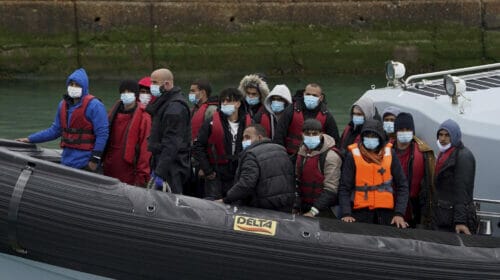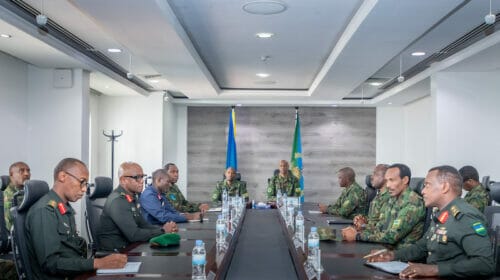Rwanda – Authorities hound independent journalists at home and abroad
 Reporters Without Borders condemns the Rwandan government’s lack of transparency and its unacceptable acts of harassment and intimidation of journalists with the aim of suppressing freedom of information and independent reporting.
Reporters Without Borders condemns the Rwandan government’s lack of transparency and its unacceptable acts of harassment and intimidation of journalists with the aim of suppressing freedom of information and independent reporting.
Rwandan journalists have been the victims of the government’s harassment for years, but the targets have for some also included foreign journalists, especially Ugandan ones.
“The Rwandan government often responds to charges of blocking information by portraying itself as the target of malicious international groups that secretly wage what it calls a ‘Blame Rwanda’ campaign,” said Cléa Kahn-Sriber, head of the Reporters Without Borders Africa desk.
“President Kagame needs to understand that people can use legitimate arguments to criticize his government without questioning the very foundations of the Rwandan state. How will his country be able to rebuild its social fabric when raising even slightly sensitive subjects are forbidden?”
Kahn-Sriber added: “A real reconciliation policy should let all voices be heard, even critical ones, and it is up to President Kagame to start it. For the sake of Rwanda’s long-term development, the government must allow freedom of information.”
In the latest case, US freelance journalist Steve Terrill was refused access to Rwanda when he arrived in Kigali on 15 March to cover the 20th anniversary of the Rwandan genocide for Al Jazeera and The Christian Science Monitor. He was detained for several hours without being allowed to make any phone calls and was then put on a flight to Addis Ababa.
Under Rwandan regulations, US journalists do not need a visa to work in Rwanda and the Media High Council agreed in principle to give Terrill accreditation when he contacted it several months ago. The Rwandan government gave no reason for barring Terrill but tweeted an article about an old judicial case in which he was exonerated.
Terrill’s expulsion is just the latest in a series of cases of harassment of journalists who dare to question government policy.
Sonia Rolley, a Radio France Internationale journalist who was based in Kigali until expelled in June 2006, has been harassed for months on Twitter by a person using the alias of Richard Goldston who is thought to be close to the president.
In a sequence of tweets in which Terrill demanded that this “Goldston” stop the “misogynistic harassment” of Rolley, someone intervened using President Kagame’s official Twitter account, reinforcing the impression that the person responsible for the harassment was close to the innermost circles of government.
The impression was not dispelled when the president’s office tweeted that “@RichardGoldston was an unauthorized account run by an employee in the presidency.” The President’s office subsequently said the account belonged to a “junior employee” (as if a “junior employee” would have access to the president’s Twitter account) but refused to identify the person or say what action was taken.
Terrill had emailed the president’s office a few weeks earlier reporting that he had established that the offensive @RichardGoldston tweets were coming from inside the president’s office, but got no reply. Since this controversy, many journalists have been blocked from Kagame’s official Twitter account.
Rwanda’s harassment of journalists extends to neighbouring countries. Several Ugandan journalists who have covered Rwanda-related stories have recently received disturbing threats from the Rwandan regime, acting in some cases through its security and intelligence services.
Four journalists with the Kampala-based Daily Monitor newspaper are the current targets of threats, including death threats. Rwandan state-owned media and intelligence services have accused them of collaborating with the Rwanda National Congress (RNC), an exile opposition group, and carrying its propaganda.
On 18 February, a post by a blogger known for being provocative and controversial, named three journalists as being in the sights of the Rwandan external intelligence services, which were acting with complicity of The Daily Monitor’s executives and a former Daily Monitor journalist now close to the Rwandan president’s office.
A week before that, a Rwandan pro-government newspaper, The New Times, published an article on 10 February claiming that the Rwandan government had established that certain Ugandan journalists had links with the RNC and with Gen. Kayumba Nyamwasa, a former Rwandan army chief now in exile.
Ivan Okuda, a journalist who freelances for The Daily Monitor, was forced by the newspaper’s management to publicly apologize on 14 February for posting blistering comments about Kagame on his Facebook page in connection with Patrick Karegeya’s murder in South Africa in January. Rwanda’s former spy chief, Karegeya had become an outspoken critic of the Kagame government.
Other Ugandan journalists have told Reporters Without Borders that they have often received serious threats from the Rwandan authorities.
Andrew Muhanguzi, a brother of an exiled Rwandan journalist who lives in Sweden and edits the Umuvugizi news website, has been missing since 16 February, when he was detained in Kampala by men identifying themselves as Ugandan police officers. The Ugandan police say they have no record of his arrest.
Tom Malaba, an experienced journalist currently working for Ugandan Radio Network (an online news agency), claimed he had been trailed repeatedly and his home attacked at night once after he at a news conference in Kampala on 18 June 2013 asked a question that upset Rwandan Ambassador Frank Mugambage. He had sought clarification on allegations that the Ambassador headed a commando that hunted down Rwandan exiles in Uganda, eliciting an angry reaction from Mugambage.
International media are not spared the Rwandan government’s harassment of journalists in Uganda. A Kampala-based correspondent for an international news organization left Uganda in November 2013 because he feared for his life after receiving disturbing threats from Rwandan intelligence officials.
Long the darling of the international community because of its stability and economic progress, Rwanda continues to be a very authoritarian country that is under President Kagame’s thumb. A predator of freedom of information who tolerates no dissent, Kagame uses anti-genocide rhetoric to justify totalitarian policies and constantly violates human rights.
Two journalists were killed within the space of 18 months in 2010 (a presidential election year) and 2011. At the same time, many media freedom violations were reported, ranging from arrests of media personnel to physical attacks, prompting many journalists to flee abroad.
The most recent murder of a Rwandan journalist was that of Charles Ingabire, an outspoken critic of the government and editor of the Inyenyeri News website, who was gunned down on 30 November 2011 in Kampala, where he had lived in exile since 2007. The Ugandan police have never released a report on their investigation into his murder.
Jean-Léonard Rugambage, the deputy editor of the bimonthly magazine Umuvugizi, was fatally shot four times at close range outside his Kigali home on 24 June 2010. Reporters Without Borders was sceptical when a court, on 15 September 2011, sentenced a man to 10 years in prison for his murder and acquitted another.
Rwanda is ranked 162nd out of 180 countries in the 2014 Reporters Without Borders press freedom index.
Source: Reporters Without Borders


